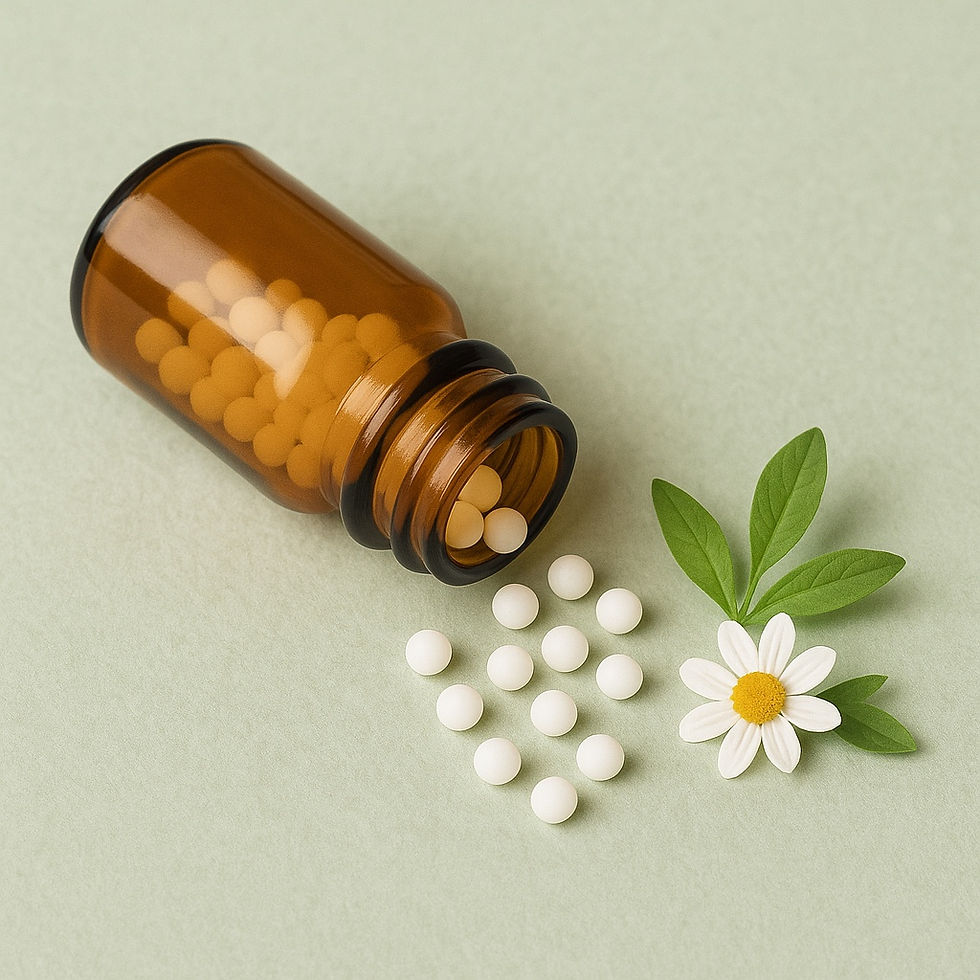Homeopathy - The Future of Holistic Healing
- shahdevang90
- Jul 22, 2025
- 3 min read
Updated: Jul 29, 2025

In a world buzzing with medical advancements, cutting-edge surgeries, and rapid diagnostic tools, you might wonder: Where does a 200-year-old system like homeopathy fit in?
While conventional medicine excels at acute care and emergency interventions, it often struggles to address chronic illness, autoimmune conditions, mental health issues, and the overall sense of dis-ease people feel despite "normal" reports.
This is where homeopathy doesn’t just remain relevant—it becomes essential.
1. Healing the Person, Not Just the Disease
Modern medicine often targets symptoms. If you're anxious, take an anti-anxiety pill. If you have a skin rash, apply a steroid. While this offers temporary relief, the root cause often goes untouched.
Homeopathy goes deeper.It sees symptoms as expressions of a deeper imbalance and works to identify and treat that core disturbance.
2. Personalized Individualized Care
No two people are exactly alike—even if they share the same diagnosis. One person’s migraine may come after stress, another’s from sun exposure. One child with asthma may be timid and sensitive; another may be fiery and stubborn.
Homeopathy thrives in this complexity. It treats individuals, not labels or diseases, making it perhaps the most personalized form of medicine available.
3. Addresses both Mind-Body connection
Today, mainstream healthcare is waking up to the mind-body connection. But homeopathy recognized it over two centuries ago.
Homeopathic remedies don’t just treat physical complaints—they often bring relief from long-standing emotional wounds, subconscious fears, or unresolved traumas that may be silently driving disease.
4. Gentle, Safe, and Non-Toxic
In a time when overuse of antibiotics, medication side effects, and drug dependency are real concerns, homeopathy offers a gentle alternative.
Safe for newborns, pregnant women, and the elderly, its remedies work with the body’s natural healing mechanism — not against it.
5. Integrative, Not Oppositional
Homeopathy doesn’t demand you abandon conventional medicine. In fact, it works beautifully alongside it, reducing side effects, boosting immunity, and enhancing recovery.
More and more progressive doctors now view homeopathy as a powerful complementary therapy that supports holistic patient care.
6. Understanding Health at a Deeper Level
Lifestyle diseases, stress-related conditions, and vague, hard-to-treat complaints are on the rise. Often, blood reports are normal, but the person still feels “off.”
Homeopathy provides a lens to look beyond the physical, to understand health as a dynamic balance of mind, body, and energy. It helps people feel well—not just appear well.
7. The Medicine of the Future
As healthcare costs soar and people search for sustainable, natural solutions, homeopathy stands out:
• Affordable
• Non-invasive
• Root-cause oriented
• Patient-centric
All it requires is careful listening, detailed observation, and nature’s wisdom in the form of potentized remedies. No high-end machines—just a deeper connection between doctor and patient.
The World Needs Homeopathy—Now More Than Ever
In an age of information overload, chronic stress, and emotional burnout, homeopathy reminds us that healing is not about suppression but restoration of balance.
As practitioners, it is our responsibility to evolve, refine our methods, and reach those who need us most. Let’s not ask if homeopathy is still relevant.
Let’s affirm: Homeopathy is timeless—and its time is now.
Curious About Homeopathy? Let’s Chat!
Whether you're new to homeopathy or just want to see if it's right for you, I'm offering a free 15-minute Discovery Call. This is a great opportunity to ask questions and explore how homeopathy can support your health journey. We'll meet on Zoom or Google Meet—just a relaxed, no-pressure conversation.
Email me at shahdevang90@gmail.com to book your spot.
Dr. Devang Shah, MD (Hom)



Comments